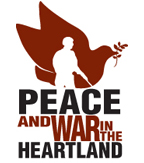
- Donate
- Donate through Springboard for the Arts
- Springboard for the Arts
- See the Play
- "Peace Crimes: The Minnesota 8 vs. the war"
- at Rarig Center
- Feb 21-March 9th
- Tickets
-
Read the Blog - Veterans Letters Project
Questions & Answers
About the PWH Project
1. What inspired the Peace and War in the Heartland project?
PWH is inspired by the trials of the "Minnesota 8," a group of U of MN students. After years of protesting the war through lobbying, petitions, mass marches, etc., they judged that the government not only would not respond to the voice of the people, but that the government was acting illegally on several fronts.
Several presidents (specifically LBJ & Nixon) had lied to the American people about why the Vietnam was was necessary (this is the false Bay of Tonkin event used to justify entry into the war), and had assumed "imperial" power by refusing to respond to the vast opposition to the war. Moreover, the constitutionality of the Selective Service System, itself, had never been ruled upon by the Supreme Court.
America was founded by a group of British citizens who judged several actions of their anointed King George as rendering him illegitimate. They spoke as "We, the People." They selected a form of government and governing - a Republican government structure grounded in the democratic voice of the people - as the best way to institutionalize the voice of "We, the People." Dissent, then, is the defining characteristic of what it means to be an American patriot. The 8 raided draft boards as a symbolic protest to a government that had lost its moral and constitutional bearing.
2. What is unique or innovative about PWH?
PWH is the only campus-based peace-and-war education project in America. Its focus is on draft age youth, 18-25, though all events are public and free. Several highly innovative features include: a) a reenactment of the draft Lottery, b) a theatrical play that evokes inter-generational discussion, and c) a series of free public lectures and small group discussions that present eight themes, each of which is a key chapter in the overall story of how and why individuals make their decisions to go to war or Resist.
3. Why are you reenacting the draft Lottery?
It's often said, "If only there were a draft, then students would be protesting in vast numbers just as in the Sixties." That's not really what happens when there is a draft. A draft simply ensures that the military has lots of people to train to kill and lots of bodies to count.
Why is this true? Because most young people do not want to kill. They don't want to go to war. If they did, the volunteer army would be glutted. Rather, unless he/she has thought this through before hand, once drafted you are faced with the dire alternatives: be trained to kill, go to prison, or accept exile and never return to America. Faced with such a bleak situation, most people reason - "It's only an 18 month obligation. Maybe I won't get sent to the front. Maybe I'll get a non-combat position. Maybe ..."
PWH runs the Lottery, hands a "Greetings" packet to the "draftee," and then provides a "What happened to you in the war?" true letter written by a veteran. The "draftee" gets a real sense of what being drafted means, and what going to war might mean - and actually did for a veteran.
4. Isn't the play about old guys? Sixties radicals?
"...the play's the thing wherein I'll catch the conscience of the King." (Hamlet) The play, "Peace Crimes," confronts all the moral and political issues that young people increasingly face, today. The parallels from Then to Now are striking. It's a great event for families to attend to frame their intergenerational discussion about the morality of Resistance. (Actually, it's sad that it cannot be said that "This is a play about an unusual and extraordinary time in America when we were at war." Unfortunately, history seems to be repeating itself with a bloody vengeance. Our youth are imperiled!)
ALERT! ALERT! ALERT! ALERT! ALERT! The military Selective Service Draft has been activated! What is your Lottery number? Click here to find out. |